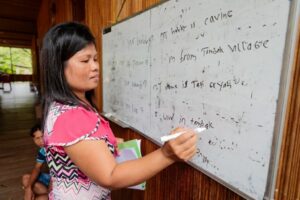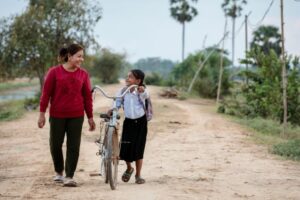For the first time in 25 years, extreme poverty levels are rising. As we speak, 193 million women live on less than $1.90 a day, and the COVID-19 pandemic will push another 47 million into poverty by the end of the year.
For the first time in 25 years, extreme poverty levels are rising. As we speak, 193 million women live on less than $1.90 a day, and the COVID-19 pandemic will push another 47 million into poverty by the end of the year.
Empowering women and girls is one of the most cost-effective and sustainable ways to fight these statistics and promote positive change in a community. When girls are supported to receive an education or skills training, they are more able to earn an income for themselves and their families.
The children of educated women have better health outcomes, are more likely to go to and stay in school, and are more likely to have access to a diverse range of food. These impacts will last long after development organisations have left.
When women’s leadership is supported, the whole community benefits. In many cases, deep, long-lasting community change begins with a single woman. The following experiences show this simple yet effective solution in action.
Aloma’s story
In the coastal areas of the Philippines, extreme weather events have caused extraordinary levels of devastation, threatening the safety and food security of many families. The country is struck by over 20 typhoons every year, with infrastructure in some remote areas taking years to rebuild.
Aloma lost her home during Typhoon Santi. She was determined to rebuild her life and after participating in the Integrated Community Development Program, supported by Caritas Australia, she learnt bookkeeping and ecological conservations skills and is now forging a brighter future for her family.

Through the program, Aloma has broadened her knowledge of sustainable farming and Disaster Risk Reduction, which she is passing on to others in her village. Aloma gained a range of skills through the program, including bookkeeping, managing logistics, and understanding ecology and environmental conservation.
By listening to what communities in Aloma say they need most, rather than deciding what we believe to be the best way to help, we are able to empower individuals who will then enthusiastically share this with others – creating an exponential impact.
Aloma is now a member of Barangay Disaster Risk Reduction Management Council. She communicates with the Municipal Disaster Risk Reduction Office to receive updates on typhoons, sends warnings and updates to the community via group chats and prepares the evacuation centers by checking the supplies of medicine, food, and water.
She has become a community leader, training others so that they can be better prepared to withstand emergencies, including typhoons and the current COVID-19 pandemic.
“All the skills that I learned, I pass on to friends and neighbours,” she says. “The most I can do to lead other people is to empower women by explaining to them the situation and advise them to follow and cooperate in implementing rules in the community, especially in this time of pandemic because they are the ones who can spread important information to their families.”
Oliva’s story
Oliva lives in the Arusha region of northern Tanzania with her farmer husband and four children. Oliva runs a kiosk that sells grocery products and serves tea and snacks. To make ends meet, she also works as a casual labourer on local onion farms.
Growing up in Tanzania, twenty-two-year-old Oliva didn’t have the opportunity to go to school. She went through life embarrassed that she was unable to read, write or count. As an adult, her small business lost money because customers were taking advantage of her.

Three years ago, Oliva attended a village meeting about the A+ Program run by Caritas Australia with our local partner, Diocese of Mbulu Development Department (DMDD). As part of the program, Oliva started attending literacy classes in the village. She noticed that other women were interested in the classes, but were too shy and embarrassed to be in the same class as their children.
She decided to set up a classroom in her home so she could share what she was learning free of charge with other women who were too shy to attend public classes. Oliva has now graduated, as have some of her students – and attendance at her classes is growing. Her children are also able to learn in the village, instead of walking seven kilometres to school.
“My students are happy and are highly motivated, as they see me teaching them and believe that one day they will be like me,” says Oliva. “My business is growing because I can keep my financial records without confusion, and save and buy basic needs like food, medicine and farm materials. Education has also enabled me to come closer to my children, as we do homework together.”
What more can we do?
Many of us want to help empower women like Aloma and Oliva but are unsure where to start. It’s easy to get stuck ‘naval gazing’ when faced with the huge task of creating real, lasting change. The scale of the task can sometimes stop us in our tracks.
But as Aloma and Oliva’s stories show, small changes can have big effects. With this in mind, events like Caritas’ annual Women for the World campaign work to bring Australian women together to stand with women across the world.
The idea is to encourage women to host their own kind of fundraiser – a dinner, book club or online gathering for those still in lockdown. It’s just one example of how small steps have the power to make a big change for women and therefore whole communities across the world.
Kirsty Robertson is the CEO of Caritas Australia, the international aid and development organisation of the Australian Catholic Church. Kirsty started her career at Caritas Australia before spending time at Anglican Board of Mission, forceten (now Act for Peace), and as CEO of Mary MacKillop Today. She returned to Caritas Australia in September 2019 to become the first female CEO of the organisation.
- This author does not have any more posts.











